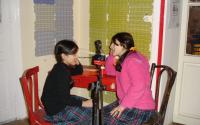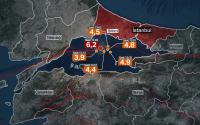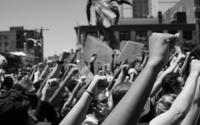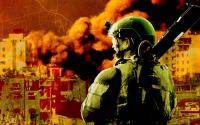21 October 2002Znet / Ha'aretz
This is my daughter," B. pointed proudly at the girl walking beside him in the Tul Karm neighborhood. "She is 10," he said in Arabic and Hebrew, adding, "but she is not a local product." B. spent 15 years in an Israeli prison for Fatah activities. He was released and in the first intifada was sought by the Israeli authorities. He managed to enter and leave the country, and his daughter was born abroad. Like tens of thousands of other Palestinian prisoners, he learned his Hebrew from the Hebrew primer "A Thousand Words" and from the newspaper for new immigrants. Every evening at six, Tul Karm is placed under curfew, but fewer tanks, armored cars and bulldozers are visible now. Their number appears to have diminished in recent weeks and it seems that soldiers are no longer shooting "at anything that moves after curfew," as they did previously. Consequently, between the roaring rounds made by the tanks on the main street near B.'s neighborhood, people now stroll back and forth between the falafel shop and the thorny field nearby. A few moments later, an armored vehicle and a jeep thunder into a dark street nearby in pursuit of a taxi that is violating the curfew. The hoarse megaphone barks out an order in Arabic and Hebrew: Get out of the car. In the neighborhood, everyone freezes until the lights of the army vehicles move once again, followed by the lights of the taxi. B. visits a friend in the neighborhood almost every evening. "I live 200 meters away, but when I return home at night, I'm scared," he says. "Maybe they will shoot from afar; maybe I will happen on a group of commandos disguised as Arabs that will open fire without warning." Every corner of the neighborhood bears witness to the bloody conflict in Tul Karm and all the other Palestinian towns. Wajdi Alam, 13, once lived in a stone house surrounded by fruit trees. On November 6, 2000, he and other children hurled stones at an IDF outpost and an armored IDF force. The soldiers fired shots, and he was killed. He was the tenth Palestinian casualty in Tul Karm, the 135th in the West Bank and Gaza after 39 days of conflict. His brokenhearted father said in a television interview that now he wouldn't mind going out on a suicide mission himself. A few months later, the father was arrested and placed in administrative detention (without charge). The two young sons of Z., the owner of a factory that is shut because of the closure, used to play with Wajdi in the neighborhood. They still play there, even on the many days when a curfew is imposed and they are unable to get to school, and even when tanks drive by. But when they walk beneath the closed shutters of their friend's home, they slow their pace and become withdrawn. Almost every morning, after a tank and an armored vehicle cross the neighborhood's main street, they leave evidence of their presence. The edges of the sidewalks have been pulverized and the stones dislodged; yet another water pipe has burst, another electric pole damaged, bent out of shape, its wires dangling in the air. Municipal workers daily make only the most urgent repairs. There is no point in fixing sidewalks or rebuilding the small roundabouts at the intersections, which the tanks on their numerous incursions into the town have turned into rubble. Now weeds rather than bushes and flowers cover them. According to city figures, the electric grid has suffered damage to the tune of $4 million from October 2001, when the city was first taken over, until September 2002. The water system has seen $800,000 in damage and the sewage system, $1.5 million. The unrepaired damage to the streets, sidewalks and roads is estimated at $15 million. There is no likelihood that all this will be repaired in the foreseeable future. The city's regular budget was NIS 3.5 million a month, and at present income from taxes is practically nonexistent. Those who once worked in Israel no longer can because of the closure, shops have no customers and factories that in the past paid taxes have closed their doors. Because of the complete encirclement of the city, farmers cannot market their produce outside the Tul Karm district, cars cannot be registered and there is no income from building permits because no one is building. The citizens of Tul Karm (which has an unemployment rate of 60 percent), owe the city NIS 34 million for electricity and water. Tul Karm itself owes the Israel Electric Corporation NIS 600,000, a sum that is accruing interest. If the electricity in the city is disconnected, the water supply will also be cut off, because the water pumps are powered by electricity. The municipal deficit stands at NIS 12 million. City employees receive salary advances equivalent to 40-50 percent of their paycheck in lieu of wages. Shut-ins Garbage pickup is an adventure of its own. The garbage dump is located near the village of Faroun, south of Tul Karm. However, the IDF has blocked the shorter route to the village with piles of rocks, earth and concrete. In order to leave the city using this route, the garbage trucks must be accompanied by a city bulldozer to remove the blockade, which must be coordinated with the army and the civil administration. If the authorization does not come, the trucks drive for hours among the hills in order to get rid of the garbage. Two yellow iron gates close off Tul Karm from the west - one on the road to Taibeh and the other to the Anabta refugee camp and Nablus. Nearby are IDF outposts. The soldiers have the keys to the gates and open them only to ambulances and diplomats. Food is brought into the city using the "back-to-back" method: Trucks unload their cargo in a special area near the southern gate where the Tul Karm trucks come to pick it up. This adds to the cost of food and causes damage to fresh produce. The villages south of Tul Karm have been cut off from the city by means of ramparts. Sometimes a huge tank stationed on the main road makes sure that even pedestrians do not cross the highway, which may now be traveled exclusively by Israelis. The side roads to the villages to the east have also been blocked off, but the villagers occasionally dismantle the obstructions. In this way, the road to the villages north of Tul Karm were opened. But it is next to impossible to go outside the boundaries of the Tul Karm district, 240 square kilometers in area. The main roads leading to the Jewish settlements in the vicinity closes off the Tul Karm district in the south and east, and are forbidden to Palestinian traffic. In the west and northwest is the Green Line and now a separation wall is under construction, involving the uprooting of thousands of olive trees. "Why couldn't they have waited to build until after the olive-picking season, which begins in mid-October?" residents of Tul Karm ask. "That way the families would not lose the few liters of olive oil that they could sell." B. and his daughter have not left the Tul Karm district, in fact Tul Karm itself, in two years. They have no desire to travel around the district, scarred by checkpoints, trampled fields and uprooted trees. Z. and his children have been to Ramallah once and have gone two or three times to his parents' home in a village near Qalqilyah. In the last two years, every trip out of the enclave becomes an adventure and a gamble, as the situation in the local government hospital indicates. Never have so many patients found themselves in such a serious state as now, says the director of the Thabet Thabet government hospital, Dr. Ahmed Abu Bakhar. Some felt ill but postponed treatment until the situation improved. They knew they would have to walk kilometers from one checkpoint to another, or wait hours for a permit for an ambulance to come and pick them up from the barrier at the edge of their village. Others, who are chronically ill and cannot afford the medications they need for their illnesses, came to the hospital after their situation deteriorated. Others neglected simple illnesses because they could not consult a physician. The village clinics are shut; due to the closure, doctors and nurses are unable to arrive regularly. Because illnesses are not treated in time, some 20 patients are hospitalized in the pediatric ward's 13 beds. Abu Bakhar says that there has been a dramatic rise in the number of cases of amputation of the limbs of diabetics whose treatment was neglected. Cardiac patients arrive with pulmonary insufficiency that was not treated in time, "are in hospital for two days and die," he says. A month ago, K.Z. sent his eldest son to study abroad. To do so, he borrowed money and reduced household expenditures even further. A., the second son, whispered, "Father sent my brother away because he was afraid he might join in some activity" - in other words, that he might join the other young men who have learned how to prepare bombs at home and hide them on the roads used by the tanks. One of the son's friends was killed in late September. Another acquaintance was killed during a nocturnal demonstration held by the people of the city over the siege of Arafat's offices. Z. confirms that he watched his eldest son with concern as he was influenced by everything happening around him - injured friends, acquaintances who were killed, missiles incinerating cars, wanted men killed in the middle of town. Unsettled and angry, the son wandered about the Tul Karm enclave - sometimes only in the neighborhood, and when it was too dangerous to go out, at home. Z. himself sat for many years in an Israeli jail for his activities as a member of the Popular Front. "If I believed that the activities being carried out by some young people could release us from the occupation, I wouldn't prevent him from joining. But it doesn't lead to anything - only to more disaster," he says. During their last phone conversation, he didn't even tell his son that his friend had been killed.






